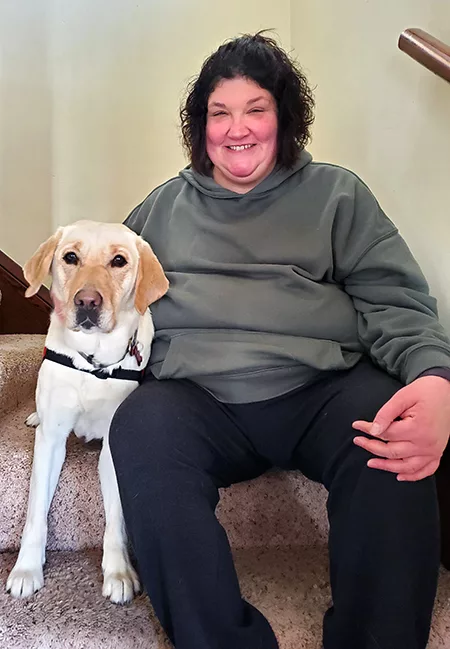People who need help regulating their blood pressure may wear compression gear, such as socks, shirts, and pants. For Meghan—who has a form of postural orthostatic tachycardia syndrome, or POTS—part of her compression ensemble is now an assistance dog.
Meghan was diagnosed a few years ago with hyperadrenergic POTS, which affects heart rate, blood pressure, body temperature, and stress hormone levels. Meghan explains, “It's like I'm in fight or flight mode all the time.”
But Meghan can’t “fight” or “flight” if she’s unconscious, which was happening quickly and frequently for her. She says, “I can be standing up for about 20 minutes and that's my max.” Whether it was from being on her feet too long, trying to pick up something on the floor, or leaning after turning in her desk chair just a little too quickly, Meghan often found herself passing out.
That type of involuntary reaction is not ideal for anyone, but it is especially incompatible with Meghan’s lifestyle. “I run a shelter for women and children, and I'm on my feet more than I'm off my feet. So this was a huge blow.”
She tried medications and medical equipment to monitor her vitals, but even going for a short walk meant wearing a blood pressure monitor. Meghan says of those options, “It’s really difficult to do your normal life.”
 So when her family doctor suggested an assistance dog, Meghan applied to Can Do Canines and was matched with Dotty, a yellow Lab. Since Meghan resides outside of the Twin Cities Metro area, she spent a week living in Can Do Canines’ client apartment and training with Dotty.
So when her family doctor suggested an assistance dog, Meghan applied to Can Do Canines and was matched with Dotty, a yellow Lab. Since Meghan resides outside of the Twin Cities Metro area, she spent a week living in Can Do Canines’ client apartment and training with Dotty.
Now, back in their hometown, the pair is continuing their hard work, and Meghan is seeing the results. While Dotty happily retrieves dropped items for Meghan, activates push plates, helps with laundry, and presses an alert button to bring human help to Meghan, one skill, in particular, is having a profound impact—deep pressure therapy.
All 51.4 pounds of Dotty serves as “compression” to keep Meghan from passing out. If Meghan needs to lie down to reduce her heart rate, she instructs Dotty to lie on top of her. Meghan reports that with Dotty’s help, “My heart rate goes down quicker than if I just did it myself and just laid there and put my feet up.” Although the normal human resting heart rate is 60-100 beats per minute, Meghan’s previously ran between 130 and 160. Just within the first couple of months of having Dotty, her average heart rate has already dropped 11 beats per minute. Meghan attests, “It’s made such a huge difference. The doctors have made comments about how fast there has been significant improvement. And it’s not from any medication.”
Meghan no longer needs to worry about fainting if she has to wait in line at a store. She states, “Dotty lays on top of my feet while we're waiting. She's getting all the blood back up to my heart. She literally will get between the cart and where my feet are and just plant herself right on my feet. Then we’ll move, and she knows if we stop again that she's going to lay on my feet again.”
Meghan is also now able to attend her high school son’s hockey games again. She says, “I haven’t been able to [see my son play hockey] in almost a year.”
That same son is often gone for hockey tournaments, and Meghan’s husband goes out of town for work. Dotty now offers Meghan assurance that when her family is away, she’s not alone if a scary health situation occurs. “She is just a huge safety feeling for me,” says Meghan.
It’s no wonder Meghan is determined to pay it forward in some way “and have someone else benefit like I am.” She concludes, “I feel very grateful for all the people that worked with her. It's a blessing to have her.”
Thank you to all those who made this partnership possible:
Whelping Home — Jan McQuillan
Great Start Home — Cardwell Family
Puppy Raiser — Federal Medical Center - Rochester
Special Thanks — Frank Barger, Casey & Ryan O’Connell
Name-A-Puppy Donor — Ann Smetana






